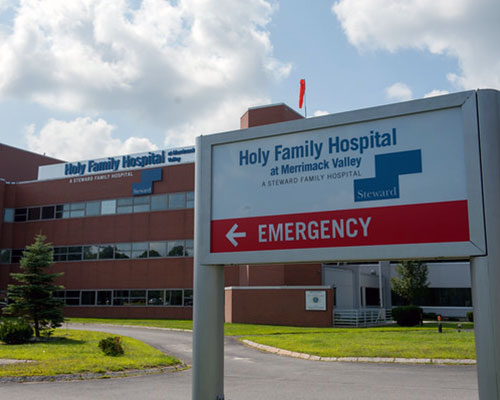Angered over the serious financial challenges at Steward Health Care that could jeopardize the future of safety net hospitals in eastern Massachusetts, top House Democrats insisted Thursday they will not bail out the company, while acknowledging the hospitals received $54 million in taxpayer money already.
Steward, which owns Holy Family Hospital campuses in Haverhill and Methuen, said last week it doesn’t plan to shutter any facilities after securing a new funding stream.
Criticizing past financing deals struck by Steward CEO Ralph de la Torre, House Speaker Ron Mariano and Ways and Means Chairman Rep. Aaron Michlewitz sounded dubious as they discussed the bridge funding deal touted by a Steward executive to stave off the feared hospital closures for now. Steward operates nine hospitals in Massachusetts, serving tens of thousands of patients including many low-income residents who have public health insurance coverage.
“We are not in a financial position to commit to financing anything to bail these people out,” said Mariano, a Democrat from Quincy, where Steward closed Quincy Medical Center in 2014 due to multi-million-dollar losses. He added, “I’ve been so close to this because Ralph was at Quincy when Quincy closed. I’ve been dealing with Ralph for a long time and I am suspect of everything he tells me.”
Mariano said his biggest concerns are “the patients and are these hospitals going to be here after the new extension Steward seems to pull out of the air whenever the pressure grows too strong.”
“This is their second extension of credit since he started talking about shutting hospitals,” Mariano told State House News Service, referring to de la Torre. “So, it seems to me, that whenever the time gets close, he figures out a way to get refinanced.”
Michlewitz said the legislature appropriated $54 million to Steward over the last three years, using federal COVID-19 relief money.
“Certainly, you know, we’ve done our share already, from a financial standpoint, in trying to keep their system afloat,” Michlewitz said of Wednesday’s hearing focused on Healey’s fiscal 2025 budget pitch. “So, we don’t foresee us coming from a financial standpoint to any bailout or any rescue.”
In the third round distributing American Rescue Plan Act funding, Michlewitz said Steward received “significantly less” because it did not share financial information with the Health Policy Commission.
Citing worries about patients accessing care and treatment near where they live, Mariano didn’t offer concrete solutions as the House works with the Healey administration to respond to the situation. Amid hospital closures and industry consolidation in recent years, lawmakers have weighed the essential closure process and establishing a state receivership mechanism.
Mariano brushed off those options when asked about the legislature’s role in managing hospital closures and why Beacon Hill didn’t intervene sooner with Steward.
“They’re private hospitals—it’s privately run,” Mariano said of Steward’s model. “It’s not a state-run hospital.”
Mariano said he and Michlewitz met Thursday with representatives whose communities are served by Steward in Dorchester, Brockton, Haverhill, Methuen, Taunton, Ayer, Norwood, Fall River, Stoughton and Brighton.
Mariano said the goal of the meeting was to get lawmakers on the same page, and for Michlewitz to stress that the legislature lacks the financial resources to come to Steward’s rescue should the request arise. Michlewitz said his colleagues understand the state’s “difficult fiscal climate” and share an understanding that lawmakers cannot handle a large bailout for Steward.
The speaker, asked about what those negotiations between Steward and Secretary of Health and Human Services Kate Walsh entail, said, “I’m not privy to them.” Michlewitz said “it’s too early to tell” what Walsh, the former CEO of Boston Medical Center, may request from the legislature.
Mariano said he did not feel blindsided by the situation unraveling at Steward. “If you paid attention to this, you knew this was coming,” Mariano said. “When he sold the land underneath the hospitals, you knew there was a game.”
Alison Kuznitz

